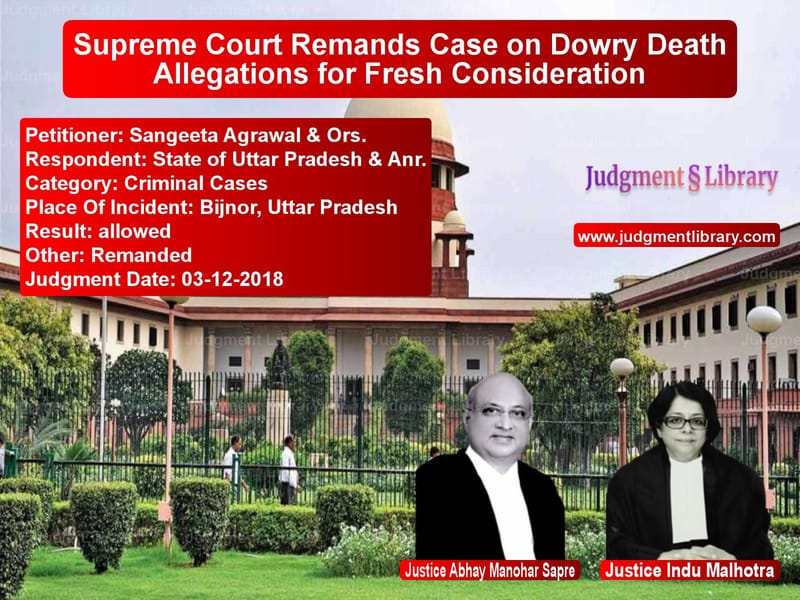Supreme Court Remands Case on Dowry Death Allegations for Fresh Consideration
The case of Sangeeta Agrawal & Ors. vs. State of Uttar Pradesh & Anr. revolved around an appeal against the decision of the Allahabad High Court, which had dismissed the appellants’ application under Section 482 of the Code of Criminal Procedure (CrPC). The case involved allegations under Sections 498A and 304B of the Indian Penal Code (IPC) and Sections 3 and 4 of the Dowry Prohibition Act, 1961.
The Supreme Court examined whether the High Court had erred in dismissing the appellants’ plea without adequately considering the factual matrix of the case. The judgment highlighted the need for courts to provide detailed reasoning in their rulings, particularly when dealing with criminal matters of such gravity.
Background of the Case
The appellants were accused in a dowry-related death case registered at Police Station Dhampur, District Bijnor. The criminal proceedings stemmed from a First Information Report (FIR) alleging that the deceased was subjected to cruelty for dowry, ultimately leading to her unnatural death.
The appellants sought quashing of the charge sheet and the entire criminal proceedings by filing an application under Section 482 of the CrPC before the High Court. However, the High Court summarily dismissed their application without engaging in a detailed examination of the case’s merits.
Key Legal Issues
- Whether the High Court had adequately considered the factual matrix before dismissing the appellants’ application.
- Whether the allegations in the FIR warranted the continuation of criminal proceedings against the appellants.
- Whether procedural fairness was upheld in the High Court’s decision.
Petitioners’ (Appellants’) Arguments
The appellants argued that the High Court had dismissed their application without properly evaluating the nature of the allegations and the evidence available on record. Their counsel contended:
“The High Court merely cited legal principles without addressing the specific factual background of the case, making it impossible to ascertain whether the dismissal was justified.”
The appellants further argued that they had been falsely implicated and that the allegations in the FIR did not establish a prima facie case warranting trial.
Respondents’ (State of Uttar Pradesh) Arguments
The respondents defended the High Court’s ruling, asserting:
“The allegations against the accused are serious in nature, involving Sections 498A and 304B IPC, which require trial and should not be quashed at a preliminary stage.”
The State argued that the complaint contained sufficient material to proceed with the criminal trial and that the High Court had correctly refused to interfere.
Supreme Court’s Observations
The Supreme Court, presided over by Justices Abhay Manohar Sapre and Indu Malhotra, found that the High Court had failed to provide adequate reasoning in its dismissal order. The Court observed:
“The Single Judge has only quoted the principles of law laid down by this Court in several decisions relating to powers of the High Court under Section 482 of the CrPC but has failed to even refer to the facts of the case.”
The Court further emphasized:
“The Single Judge ought to have first set out the brief facts of the case with a view to understand the factual matrix and then examined the challenge made to the proceedings in the light of the principles of law.”
Final Judgment
The Supreme Court set aside the High Court’s order and remanded the case for fresh consideration, directing:
“The case is remanded to the High Court (Single Judge) with a request to decide the application afresh on merits in accordance with law, keeping in view the aforementioned observations.”
The Court clarified that it was not expressing any opinion on the merits of the case but was only ensuring that the High Court undertakes a detailed examination before reaching its decision.
Significance of the Judgment
- Ensuring Judicial Fairness: The ruling reinforces the importance of courts providing detailed reasoning when deciding criminal matters.
- Protection Against Arbitrary Dismissal: The judgment safeguards against cursory dismissals of Section 482 applications without adequate examination.
- Clarity in Legal Proceedings: By remanding the case, the Supreme Court ensured that the appellants’ concerns are properly heard and adjudicated upon.
Conclusion
The Supreme Court’s decision in this case emphasizes the necessity of proper judicial scrutiny in criminal proceedings. The ruling ensures that high courts must engage with the factual and legal aspects of a case rather than dismissing petitions summarily. The judgment serves as a precedent for upholding procedural fairness and thorough legal examination in similar cases.
Petitioner Name: Sangeeta Agrawal & Ors..Respondent Name: State of Uttar Pradesh & Anr..Judgment By: Justice Abhay Manohar Sapre, Justice Indu Malhotra.Place Of Incident: Bijnor, Uttar Pradesh.Judgment Date: 03-12-2018.
Don’t miss out on the full details! Download the complete judgment in PDF format below and gain valuable insights instantly!
Download Judgment: Sangeeta Agrawal & O vs State of Uttar Prade Supreme Court of India Judgment Dated 03-12-2018.pdf
Direct Downlaod Judgment: Direct downlaod this Judgment
See all petitions in Dowry Cases
See all petitions in Suicide Cases
See all petitions in Judgment by Abhay Manohar Sapre
See all petitions in Judgment by Indu Malhotra
See all petitions in allowed
See all petitions in Remanded
See all petitions in supreme court of India judgments December 2018
See all petitions in 2018 judgments
See all posts in Criminal Cases Category
See all allowed petitions in Criminal Cases Category
See all Dismissed petitions in Criminal Cases Category
See all partially allowed petitions in Criminal Cases Category







